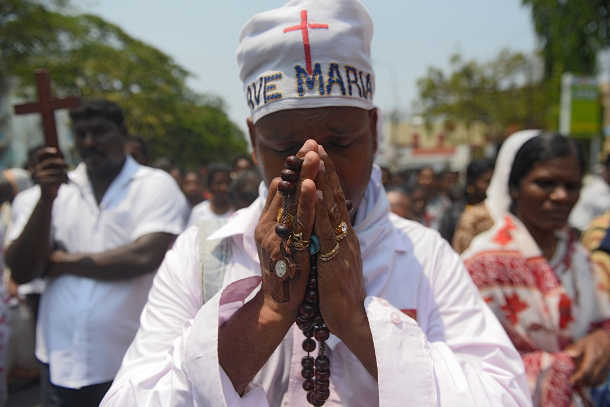
Indian Catholics take part in a procession on Good Friday in Chennai on March 30. (Photo by Arun Sankar/AFP)
Indian Christians must unsurprisingly be looking forward to a new year of peace and dignity as a year with shocking scandals of bishops involved in sexual abuse and fund swindling draws to an end.
Scandals involving three prelates — two bishops and a cardinal — made international headlines, forcing Pope Francis to intervene and remove them from administrative positions.
Public protests, court cases and police investigations of sexual and financial violations indeed dented the public image of the church as an institution of integrity and transparency.
The controversies also helped remove the hallowed perception ordinary people hold of their hierarchs. But it also sadly divided priests and lay Catholics into supporters and critics of the bishops in question.
The first shocker came early in the year when some priests of the Ernakulam-Angamaly Archdiocese alleged that their Major Archbishop Cardinal Alencherry, along with two senior priests, sold several plots of land, incurring a loss of more than US$10 million.
The self-governing Eastern Rite Church, which has a synod empowered with all administrative powers, refused to act against the cardinal, the head of the church and the synod.
The silence of the synod and the bishops was distressing. The rest of the hierarchy and the bishops' forum in India refused to even to acknowledge the controversy as the media continued to challenge the sincerity of bishops in addressing the case.
More than six months after the controversy emerged, on June 22, Pope Francis removed the cardinal from administrative responsibilities of the archdiocese and appointed Bishop Jacob Manathodath of Palghat as administrator. The Vatican also mandated the new administrator to investigate the case.
Just as that controversy was dying, another horror hit the church in the form of a June 29 police complaint from a 48-year-old Catholic nun in Kerala, southern India.
She accused 54-year-old Bishop Franco Mulakkal of Jalandhar of raping her 13 times between 2014 and 2016 when the bishop visited her Kerala convent from his northern Indian diocese.
The bishop denied all charges. He maintains the allegation of the nun, a former superior general of the Missionaries of Jesus congregation under the bishop's patronage, was an act of vengeance against him for initiating disciplinary action against her violations of religious vows.
Silence prevailed again within the church. And police appeared to be dragging their feet on the investigations, when on Sept. 8 five nuns from her convent began a public protest demanding the arrest of the bishop.
With public support increasing for the nuns, police were forced to follow the law that mandates arrest of the accused rapist. As the bishop's arrest became imminent, church officials announced a Vatican decision to remove Bishop Mulakkal from the administration of his diocese on Sept. 19. The bishop was arrested two days later.
The removal of the third prelate — Bishop Prasad Gallela of Cuddapah in Andhra Pradesh — on Dec. 10 also came after a long, drawn-out scandal in which he is accused of swindling diocesan funds to maintain his alleged "wife" and child. He denied the allegations.
The case made headlines when two lay people went to court against Bishop Gallela in May with allegations of money laundering, misappropriation of diocesan funds, corruption and cheating civil and religious authorities.
It's an open secret that top church officials knew of Bishop Gallela's case for so long that his alleged son is now a university student. The hierarchy tried to push it under the carpet by ignoring it, several priests in the region and parishioners in the dioceses say.
Investigations of the case will continue well into the new year, giving new lessons for the hierarchy.
Undoubtedly, the controversies are a sure to be a wake-up call for the church to get its act together by cleaning up its hierarchical leadership and strengthening its administrative acumen.
It should be the collective effort of all — hierarchy and lay faithful — to bring back the lost dignity and respectability to Christians, who continue to face harassment and attacks in states where they are socially and economically poor.
Despite the controversies, the church continued its social involvement.
Catholics' readiness to help disaster-hit people continued gain applause during flooding and when cyclones hit the nation. The church's social service agency Caritas was at the forefront of helping flood and cyclone victims in several Indian states this year.
Catholic fishermen from coastal areas of Kerala received special appreciation, even from the state government, for their impromptu rescue operation using their own boats during brutal August floods, the worst in a century.
Christian leaders privately agree that they look forward to a political change in New Delhi next May, when Prime Minister Narendra Modi's government, led by the pro-Hindu Bharatiya Janata Party (BJP), completes its term.
Christian leaders have been complaining about increased attacks on their people after Modi's government came to power in 2014. They say Hindu groups stepped up violence against religious minorities in their push to make India a wholly Hindu nation.
Some changes were seen in the political arena when the BJP lost the November-December elections in five states, conceding victory to rival Congress in three major states. Regional parties won elections in two.
Christians, who are traditionally seen as Congress supporters, have reason to hope for a political shift.
In the year ahead, Indian Christians look forward to a wind of change, both politically and within their churches.
Christopher Joseph is the bureau chief for ucanews.com in India.


